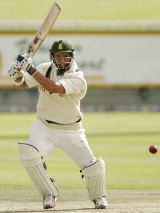Prince of darkness
Ashwell Prince's appointment as South Africa's first black captain is either the most important and significant moment in the game's history in this country or utterly irrelevant
24-Jul-2006
|
|

|
Or it is both.
Every year, month or even week there has been a new landmark or
other; from the first black player 15 years ago (Omar Henry) to the first
time there were two, three, four or five players in a national team. And the
first black president, chief executive, majority on the board...the list hasn't stopped.
Every milestone is an important landmark and is deservedly recorded -
nobody disputes that. But just as Germans eventually grew tired of 'wall
stories' when the one that divided their country was being torn down, the
majority of South Africans of all hues are becoming immune to their
importance. Or perhaps it's just that they would rather concentrate on the
cricket.
Haroon Lorgat is the national convenor of selectors responsible for
Prince's appointment to the vice-captaincy after Jacques Kallis withdrew
from the tour. When Graeme Smith wrenched ankle ligaments late one night on
holiday in what was euphemistically called "an evening run" in a CSA
statement, Prince was handed the job.
In a delicious fusion of the impossible, the genial Lorgat - an
outstanding cricketer denied the chance to ever represent his country
because of apartheid - comes up with this strawberries and chilli
statement: "Ashwell's appointment is a non-event although the enormity and
significance of it should not be missed."
If that sounds like gibberish to you then you're probably not South
African. If you are South African then you're probably smiling.
"His appointment, albeit through forced circumstances, will not be
missed and, in fact, should be celebrated by South Africa and the rest of
the world," Lorgat says, beginning his explanation of the apparent
contradiction. "As the first black man to captain South Africa he will
command an important place in history - but with that comes extra
responsibility.
"For the team, however, it will be a non-event. From personal
conversations I know how much respect the players have for Ashwell and they
are all very comfortable with him leading," Lorgat said. "His ability to assess match
situations and remain calm and level-headed at any time is not questioned."
And that is not 'spin'. He has captained South Africa A in three
victorious series and led the same team to a three-day victory over England.
There are still many members of Lorgat's generation who will,
understandably, neither forget the hurt of their youth nor forgive the
society that perpetrated it. But what about the current generation of kids?
What do today's teenagers think about Prince's elevation to the national
captaincy.
"To be honest, I wouldn't dare ask," says schoolboy coach and freelance
cricket writer John Young. "I'd be running the risk of embarrassing myself.
They would be completely puzzled by the question."
The 13-year-olds Young coaches at SACS in Cape Town were born after
cricket unity in 1992 and have only known equal opportunity. In fact, if
they have been aware of 'prejudice' in their sporting lives it would have
been because of the quota system that has been in place at schools level for
a decade, a system designed to speed up the transformation of the country's
sport. It is rarely spoken about openly in front of the boys - at first
because it was feared they may be traumatized but, in recent years, because
it is largely redundant - certainly in the Cape.
|
|

|
It may not be what Prince wants because he is not, and has never been, a
headline seeker, but if he is to leave a legacy it may well be as the man
who expedited the abolition of quotas.
He first spoke publicly about his distaste for enforced selection along
racial lines as far back as 2000 and repeated this sentiment six months ago
when giving an interview to the South African edition of The Wisden Cricketer:
"The quota or 'target' system is wrong for one simple reason - it messes
with the minds of both white and black players. What does a group of
Under-17 players feel when their provincial under-18 squad is announced? How
many of them don't have a doubt about their inclusion or exclusion? 'Am I
here because I'm black?' 'Am I left out because I'm white?'
"Most of the time those doubts wouldn't even be there if there wasn't
this system in place. It takes a very strong 17-year-old to rise above the
doubts; he either has to be very strong or very naïve not to allow the
doubts to get to him," Prince said.
His own move from Eastern Province to Western Province in the mid-1990s was often
misconstrued as a 'political' move by WP to bolster their non-white
representation but the truth is that Duncan Fletcher, then coach at
Newlands, liked what he saw.
Prince has risen above the doubts but it took him years to do so. He
can, and should be forgiven if he decides to concentrate on his game and let
his bat do the talking. But, if he starts playing well, he may decide to
repeat his assertion that today's kids shouldn't have to endure the same
doubting and suspicion that he did.
And as captain of the national cricket team that could have a very big
effect indeed.
Neil Manthorp is a South African broadcaster and journalist, and head of the MWP Sport agency